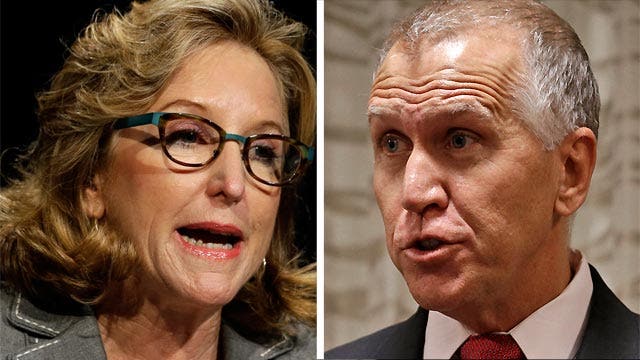Outside groups influential in North Carolina Senate race
Jeanne Zaino and Basil Smikle Jr on how big money is impacting the election
Money talks -- but in North Carolina’s hard-fought Senate race, it practically shouts.
Political parties, private donors and outside groups are pouring cash into the contest between Democratic Sen. Kay Hagan and Republican challenger Thom Tillis. With just a few weeks until Election Day, total midterm spending in the state has hit an estimated $228 million and is climbing still, with most going toward the Senate contest – putting North Carolina on course to be among the costliest midterms in history. That total is close to what all Democratic Senate candidates spent on their races a decade ago.
Even outside groups are weighing in heavily, shelling out $34 million to date to support or oppose the candidates in the state, according to the Center for Responsive Politics.
“They’ve been one of the key factors,” said Jeanne Zaino, political science professor at Iona College, adding that so far the outside money has broken in Hagan’s favor, as she leads by a few points in most polls.
The Center for Responsive Politics analysis shows $20 million has been spent by liberal groups in the state, compared with $14 million by conservative groups.
One such group, the conservative Americans for Prosperity, launched a tour across the state last week aimed at lambasting Hagan’s record across 14 cities in five days.
The “Call Out Kay” tour stopped by the iconic Charlotte Motor Speedway in Concord, N.C., last Thursday for a rally and information session. Their message was clear: They might not all be on Team Tillis, but they all agree it’s time for Hagan to go.
“I like her as a person, I just don’t like her voting record,” AFP’s state director Donald Bryson told FoxNews.com.
The roughly 50 people who attended were treated to political pitches and ample helpings of comfort food: grilled chicken, mashed potatoes and iced tea.
Mid-meal, dressed down in dark jeans and a gray blazer, Bryson launched into his indictment of Hagan’s record, blasting a series of votes: Yes on ObamaCare; Yes to increasing the debt limit until 2015; and Yes on the stimulus.
Grover Norquist, president of Americans for Tax Reform, followed with a simple message: “We are low maintenance. We are a ‘leave us alone’ coalition.”
Despite the event’s folksy feel, make no mistake, one volunteer told FoxNews.com, “We will do whatever it takes to get our message across and defeat Kay Hagan.”
So far, that’s mostly translated to purchasing a whopping $8 million in ads aimed at taking down Hagan in the November election.
As for the $34 million spent to date in the state, that figure is likely to double or triple as Election Day nears, political analysts tell FoxNews.com.
New changes to campaign finance rules have opened up a treasure chest of cash for donors that could determine which party gains dominance in D.C. Up for grabs across the country are 435 House seats and 36 Senate seats. Republicans need to gain six seats to retake control of the Senate.
The high-stakes races are seeing an unprecedented amount of money courtesy of outside groups.
Some of this is dubbed “dark money” – the term used to describe money spent on political campaigns by innocuously named donors or groups whose identities are largely hidden via loopholes in disclosure laws, according to the Sunlight Foundation, a nonpartisan organization that advocates for open government.
Lisa Gilbert, a director at Public Citizen, a nonprofit think tank in Washington, recently told Newsweek that the “sheer numbers on display have caused this year to be christened the dark money election.”
According to an ongoing Center for Public Integrity analysis from ad tracking service Kantar Media/CMAG, more than 58,100 television spots have been bought for the North Carolina Senate race – at a price tag of $29.6 million.
Of that amount, $20.1 million was spent by outside groups, meaning they were not paid for by the candidate or the political party he or she represents.
At one Charlotte television station, outside groups bought virtually every political ad on air.
According to Echelon Insights, a Republican digital consulting firm that tracks spending by candidates, parties and groups, there are already 12,530 political ads paid for and ready to air in North Carolina during the next three weeks.






















